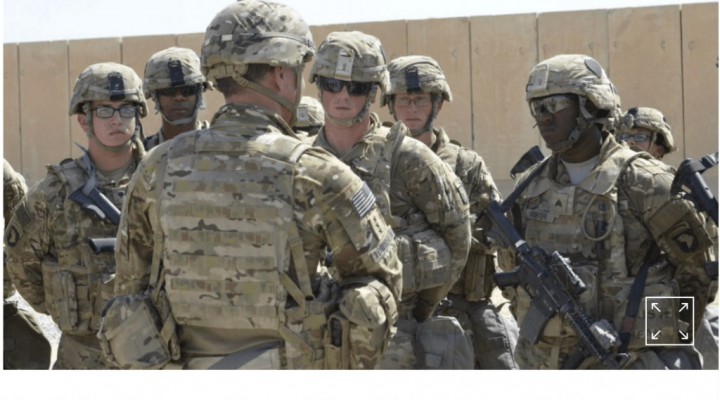Iran rejects Iraqi-US “cosmetic surgery,” but US-Iran cooperation is not impossible 2/6

Iraq is not the only theatre where the US and Iran clash. Syria is another arena where the two countries will find it challenging to find common ground. The US forces are occupying northeast Syria to prevent the Syrian economy from recovering and to slow down – without blocking – the flow of weapons, energy, and economic support that Iran supplies its allies with in Syria and Lebanon. Biden’s administration has no strategy in Syria and Iraq. Still, it seems determined to follow Donald Trump’s policy and stay in both countries with little visibility for the future of these countries’ forces. Therefore the status quo is expected to be maintained, keeping the tension between Iran and the US at a high level, independently. of any positive outcome in the nuclear discussions this year. However, this tension in various arenas doesn’t stop direct and indirect dialogue and contact between the US and Iran.
Although the US administration “welcomed” the beginning of the Iranian Revolution with sanctions since 1979, Tehran, from its side, also challenged Washington’s authority repeatedly. President Jimmy Carter imposed sanctions on Iran in November 1979 when Iran seized the US embassy in Tehran and took US diplomats as hostages for 444 days. Iran released the hostages only when a new US President assumed power in 1981: Ronald Reagan. Iran succeeded in obtaining the release of almost 8 billion dollars of its frozen financial assets in exchange for the 52 US Embassy hostages. Reagan offered a “gift” to Iran when Robert McFarlane was received in Tehran by Speaker Sheikh Hashemi Rafsanjani – following the Ruhollah Khomeini’s approval – with a cargo full of weapons that were later known as the “Iran Contra”.
In the 1990s, Iran and the US cooperated on many common interests on the European continent and the Middle East. President George Bush (the father) asked Iran to release the US hostages captured in Lebanon, marking the beginning of a “goodwill” relationship. In 1999, Iran accepted to join Afghanistan’s neighbouring countries’ coalition, the six-plus-two initiative group (Iran, Pakistan, Turkmenistan, Uzbekistan, Tajikistan and China plus Russia and the US). This opportunity created a unique, privileged and valuable position for Iran. Doing so has undermined some US calls for war against the “Islamic Republic” by warmongers in the US administration and intelligentsia researchers. Iran becomes a special partner.
The six-plus-two groups did not last for very long but opened the door wide for US-Iran cooperation. Iran has succeeded in replacing Pakistan, which was the traditional US partner, accused of supporting the Taliban and playing an ambiguous role in the US war on the Taliban. Iran managed to elbow Russia, Italy, and Germany away from Afghanistan’s discussions by establishing direct contact with US envoys. The Iranian officials were thrilled to turn the tables against those advocating attacking Iran first and they watched the US war machine turn against its enemies in the region. That allowed Iran to relax for a while and organise itself to organise its resources in support of its allies before the US storm.
Until the 2000s, direct and indirect meetings were allowed with the US under Presidents Ahmadinejad and Sheikh Hassan Rouhani and were certainly approved of by the Grand Ayatollah Ali Khamenei. When the US former President Georges W. Bush decided to attack the Taliban and Saddam Hussein, he paved Iran’s way to becoming a regional power, with two enemies on its borders defeated or engaged away from Iran. Iran has cooperated with US administrations in both countries, Afghanistan and Iraq.
Even if they kept close monitoring and preserved the revolution’s ideological principles during the Iran-US rapprochement, both Grand Ayatollahs Khomeini and Khamenei allowed the Iranian government to use a broad margin of manoeuvre when negotiating with the US. When the interests of the state prevail, flexibility was provided by the Supreme Leaders, as long as the meetings served to push a greater danger away from Iran. The Iranian officials are convinced that the US – whose leaders brought the first nuclear facility to Tehran – wouldn’t mind seeing Iran becoming a nuclear country were it not for its support to its allies in the Middle East which causes a threat to Israel. Moreover, a powerful Iran creates fear for the US’s obedient allies in the Middle East. The proof is the failure of regime change in Syria and Iraq, the ongoing war in Yemen that is equipped with sophisticated weapons and the unparallel military and economic power Hezbollah enjoy, imposing a unique deterrence on Israel.
Iran rejects Iraqi-US “cosmetic surgery,” but US-Iran cooperation is not impossible 2/6
 TheAltWorld
TheAltWorld 
0 thoughts on “Iran rejects Iraqi-US “cosmetic surgery,” but US-Iran cooperation is not impossible 2/6”